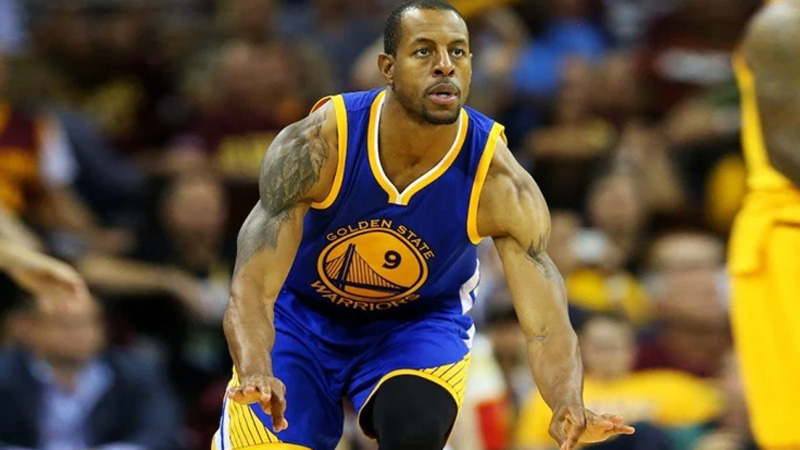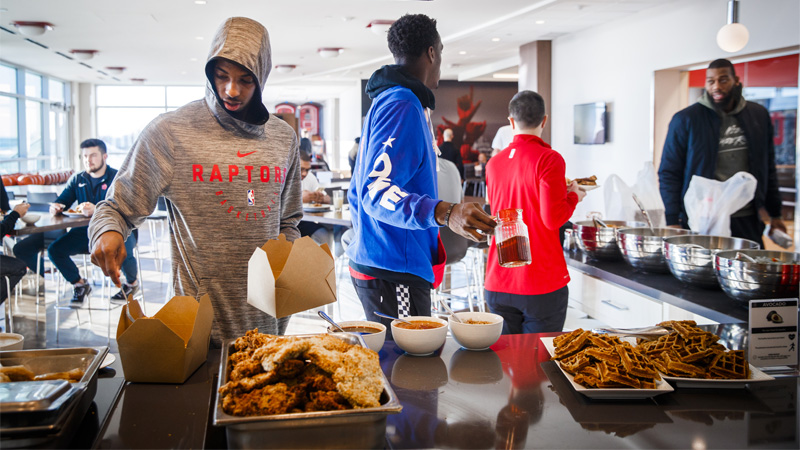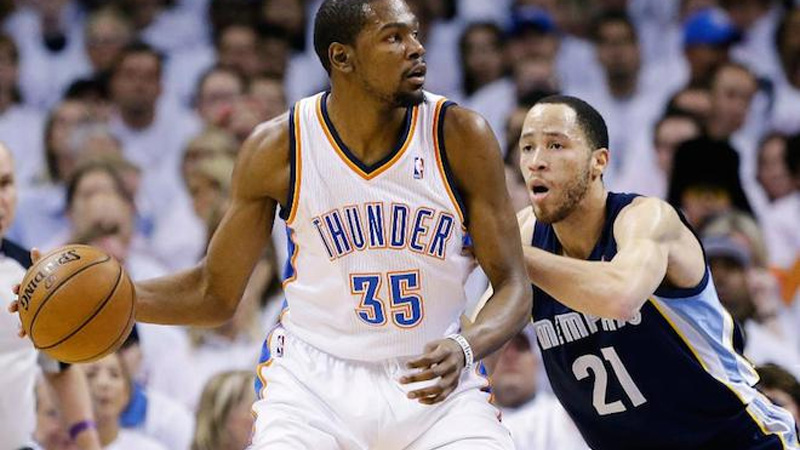People who used to enjoy basketball games might have noticed that players often have lean and slender physiques, which might lead you to wonder why this is the case. Indeed, many of them ask why basketball players are so skinny.
In this article, we’ll dive into the factors that contribute to basketball players’ slender appearance, and understand why being skinny can actually be advantageous in the fast-paced and high-flying world of basketball.
So, let’s unravel the secrets behind why basketball players often have a slender build and how this contributes to their on-court success! Stay focused.
Why Are Basketball Players Skinny?
Basketball players often appear skinny due to the specific physical demands and playing style of the sport. The slender physique of basketball players is not a limitation but rather an advantage in this fast-paced and high-flying game.
Being skinny provides players with better agility, speed, and quickness, allowing them to maneuver around opponents, change direction rapidly, and execute explosive moves to the basket more efficiently.
Additionally, a slender build helps players maintain endurance and reduce unnecessary body weight, which can hinder their mobility on the court.
While many basketball players naturally have a lean body type, it is important to recognize that a successful basketball player’s physique is a result of a combination of genetics, training, and conditioning.
Why It Is Essential for Basketball Players to Get a Lean Physique?

Source: reddit
Basketball is a high-intensity sport that demands a combination of speed, agility, and endurance.
Achieving and maintaining a lean physique is crucial for basketball players to excel in this dynamic and fast-paced game. Let’s explore the reasons why a lean body is essential for basketball players:
Enhanced Agility and Efficiency
A lean physique allows basketball players to move with agility and efficiency on the court. With less body mass to carry, players can change direction quickly, execute sharp cuts, and navigate through defenders with greater ease.
The ability to move swiftly and decisively is vital in basketball, where split-second reactions can be the difference between scoring a basket and being defended effectively.
Improved Power-to-Weight Ratio
Reducing body fat and maintaining lean muscle mass results in an improved power-to-weight ratio for basketball players. This means that players can generate more force relative to their body weight, leading to more explosive movements.
A higher power-to-weight ratio is especially advantageous for vertical jumping, enabling players to reach greater heights during rebounds, dunks, and shots.
Enhanced Vertical Jump and Acceleration
A lean physique contributes to an athlete’s vertical jump and acceleration capabilities. Vertical jumping is an essential skill in basketball, enabling players to block shots, grab rebounds, and execute gravity-defying slam dunks.
Additionally, a lean body enhances acceleration, allowing players to sprint quickly from one end of the court to the other, making fast breaks, and outmaneuvering opponents.
Reduced Strain on Joints and Injury Prevention
Maintaining a lean body helps reduce strain on joints, such as knees and ankles, during high-impact movements common in basketball. Excess body weight can lead to added stress on these joints, increasing the risk of overuse injuries and long-term joint damage.
A lean physique helps minimize this risk, promoting overall joint health and longevity in a basketball player’s career.
Long-Term Career Sustainability
For professional basketball players, maintaining a lean physique is essential for sustaining a long and successful career. As players age, the wear and tear on their bodies become more significant.
A lean body puts less stress on joints and minimizes the risk of chronic injuries, allowing players to stay competitive and perform at a high level for an extended period.
Maximizing Athleticism and Performance
In basketball, where split-second decisions and explosive movements are integral to success, a lean physique maximizes a player’s overall athleticism and performance.
It enables players to exhibit their full range of skills, from scoring points to defending effectively and contributing to their team’s success on both ends of the court.
Nutrition for Basketball Players

Source: message
Proper nutrition is a fundamental aspect of a basketball player’s training and performance regimen.
To meet the physical demands of the sport and optimize their on-court capabilities, players must maintain a well-balanced diet that provides the necessary nutrients for energy, muscle repair, and overall health.
Here, we delve into the key elements of nutrition that contribute to the success of basketball players.
Carbohydrates: The Energy Source
Carbohydrates are the primary energy source for basketball players, providing the fuel needed to sustain high-intensity activity during games and practices. Foods rich in complex carbohydrates, such as whole grains, fruits, and vegetables, should be staples in a player’s diet.
These carbohydrates release energy slowly, helping players maintain steady performance throughout a game and preventing energy crashes. Additionally, simple carbohydrates, like fruits and sports drinks, can be useful for quick energy boosts during breaks in play or halftime.
Lean Proteins: Supporting Muscle Repair and Growth
Lean proteins are essential for basketball players as they aid in muscle repair and growth. The intense physical demands of the sport lead to muscle breakdown, making protein intake crucial for recovery and maintaining muscle mass.
Sources of lean proteins include poultry, fish, lean meats, eggs, dairy products, and plant-based options like tofu and legumes. Including protein in each meal helps players support their muscle health and improve their overall athletic performance.
Healthy Fats: Supporting Overall Health
Healthy fats are vital for basketball players as they contribute to overall health and wellness. Fats provide a concentrated source of energy, and players should incorporate sources of healthy fats, such as avocados, nuts, seeds, and olive oil, into their diet.
These fats support various bodily functions, including hormone production and nutrient absorption. Additionally, omega-3 fatty acids, found in fatty fish like salmon and chia seeds, possess anti-inflammatory properties that can aid in recovery from intense workouts and games.
Hydration: Staying Refreshed and Replenished
Proper hydration is a non-negotiable aspect of nutrition for basketball players. During games and practices, players can lose significant amounts of fluids through sweat, leading to dehydration if not adequately replenished.
Dehydration can negatively impact performance, leading to reduced focus, energy, and endurance. It is crucial for players to hydrate before, during, and after games with water, sports drinks, or electrolyte-rich beverages to maintain optimal performance and prevent the risk of heat-related illnesses.
Micronutrients: Supporting Immune Function and Performance
In addition to macronutrients (carbohydrates, proteins, and fats), basketball players require an adequate intake of vitamins and minerals to support immune function and overall health.
Foods rich in vitamins C, E, and zinc are particularly important, as they can boost immune function and aid in recovery from physical stress. A diet rich in fruits, vegetables, and whole grains can provide the essential micronutrients needed for optimal performance and well-being.
Tailoring the Diet: Meeting Individual Needs
Every basketball player has unique nutritional needs based on their position, body composition, training intensity, and overall goals. As such, it is essential for players to work with sports nutritionists or dietitians to tailor their diet to their individual requirements.
A personalized nutrition plan can help players optimize their energy levels, improve performance, and enhance recovery, ultimately contributing to their success on the basketball court.
Do Basketball Players Need to Do Hard Work?
Basketball players must embrace hard work as an integral part of their journey to excellence. From youth leagues to the professional level, dedication and relentless effort are key factors that set apart the best players from the rest.
Let’s explore the various aspects of hard work that contribute to a basketball player’s success.
Commitment to Skill Development
To become proficient in basketball, players must invest significant time and effort in skill development. This includes practicing shooting from different spots on the court, perfecting dribbling techniques, mastering various passes, and refining defensive footwork.
Repetition and practice are essential to build muscle memory, enabling players to execute skills with precision during high-pressure game situations.
Engaging in Strength and Conditioning Programs
Basketball is a physically demanding sport that requires players to be agile, explosive, and resilient. Engaging in structured strength and conditioning programs is crucial for building functional strength, improving endurance, and enhancing agility.
These programs often involve weight training, plyometrics, speed drills, and cardiovascular workouts to prepare players for the rigors of the game.
Developing Basketball IQ
Beyond physical skills, basketball players must cultivate their basketball IQ. This encompasses understanding game strategies, reading opponents’ movements, making quick decisions on the court, and anticipating plays.
Studying game footage, learning from experienced coaches, and playing against tough competition are all part of the process of developing a high basketball IQ.
Consistency in Practice
Consistency is the foundation of success in basketball. Players must commit to regular practice sessions, both on and off the court, to continuously improve their game.
Whether it’s honing shooting form, perfecting defensive techniques, or working on conditioning, consistent effort and practice contribute significantly to skill refinement and overall growth as a player.
Mental Toughness and Resilience
Basketball can be mentally challenging, especially in high-stakes situations. Players must cultivate mental toughness and resilience to overcome setbacks, handle pressure, and stay focused during critical moments.
Embracing a growth mindset and maintaining confidence in their abilities are essential for navigating the ups and downs of the game.
Embracing Competition
Competing against strong opponents is a valuable aspect of a player’s growth. Embracing competition not only exposes players to different playing styles but also pushes them to elevate their performance.
Facing challenging opponents provides a platform for players to apply their skills, adapt to varying situations, and showcase their abilities.
FAQs
Is being skinny an advantage for basketball players?
Yes, being skinny can be advantageous for basketball players. A slender build often translates to better agility, speed, and quickness on the court.
Skinny players can change direction rapidly, accelerate quickly, and navigate through tight spaces more easily, giving them an edge in evading defenders and making explosive moves to the basket.
Do basketball players deliberately maintain a skinny physique?
While some basketball players may naturally have slender body types, maintaining a specific physique is a matter of individual training and genetic factors.
Basketball players undergo rigorous training regimes tailored to their positions and playing styles, aiming to enhance their performance rather than solely focusing on body appearance.
Does being skinny impact a player’s physical strength and durability?
While basketball players may appear skinny, their strength and durability are not solely determined by their size. Many players focus on building functional strength through weight training and conditioning exercises to withstand the physical demands of the game.
Endurance and stamina are also crucial aspects of their training, helping them maintain peak performance throughout a game.
Are there exceptions to the stereotype of skinny basketball players?
Yes, there are exceptions to the stereotype of skinny basketball players. While many players have slender builds, there are also players with more muscular and robust physiques.
Basketball, like any other sport, accommodates athletes of various body types, and successful players come in a diverse range of shapes and sizes.
Can skinny players be dominant forces in basketball?
Absolutely. Skinny players can be dominant forces in basketball by utilizing their unique strengths. Their agility, speed, and ability to navigate around defenders can make them formidable offensive and defensive players.
Players like Stephen Curry and Chris Paul, known for their slender frames, have excelled at the highest level and proved that size is not the sole determinant of success in basketball.
End Call
Being skinny is not a limitation but rather a unique advantage for many basketball players. The slender physique allows them to showcase impressive agility, speed, and quickness, which are essential qualities in the fast-paced and dynamic nature of basketball.
While some players may naturally have a skinny build, their success on the court is not solely determined by their size. Rigorous training, functional strength, and skill development play crucial roles in a player’s performance.
As basketball continues to evolve, players of various body types will continue to thrive and contribute to the beauty and excitement of the game. So, the next time you see a skinny basketball player dazzling on the court, remember that their physique is a testament to their unique and diverse talents.







